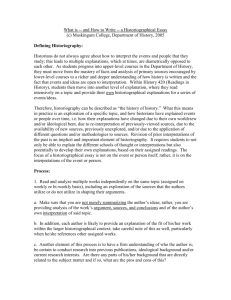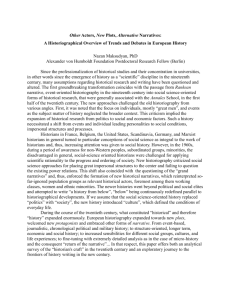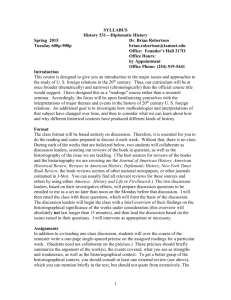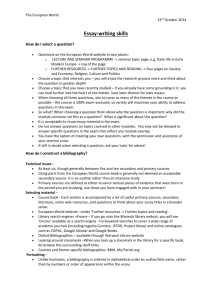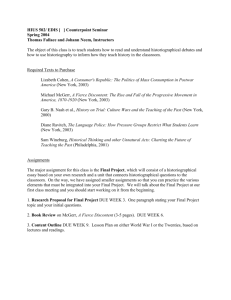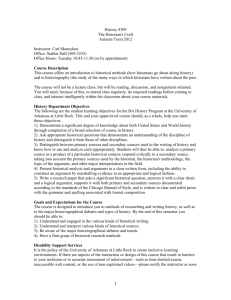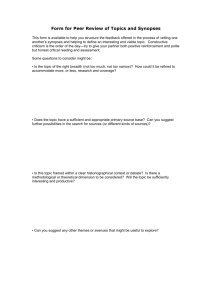(De-)Socializing Historiography of Lingusitics
advertisement
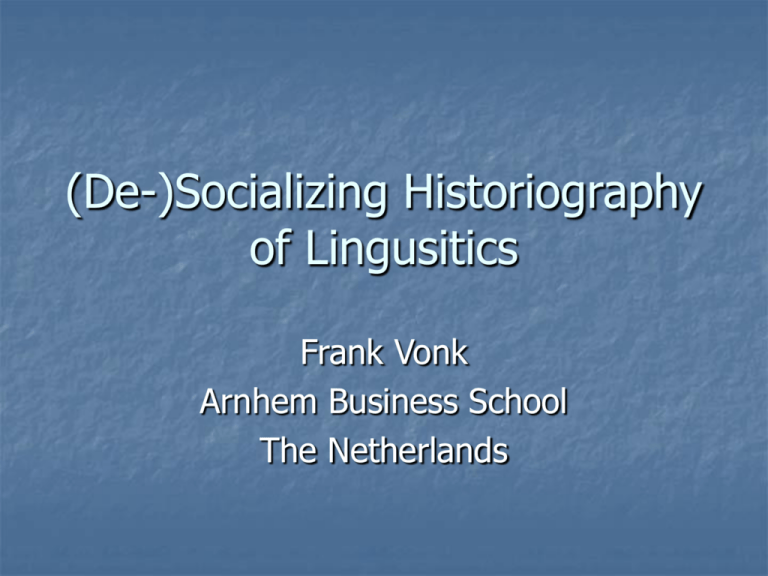
(De-)Socializing Historiography of Lingusitics Frank Vonk Arnhem Business School The Netherlands Werner Hüllen’s “Treatise” “63. Deliberations about plausibility in support of historiographical reconstructions draw on the systems of arguments and experience of the historiographical, not the historical subject. 78. Every historiographical subject turns into a historical one for coming generations; every historiographical text does the same. 79. Within the conditions of historiographical work, the historiographical subject is free in relation to history. There is no objective reconstruction, just as there is no objective recollection. 80. Reflecting on the schemata of historiography has the aim of defining the liberty of the historiographical subject vis-à-vis history” (Werner Hüllen 2005: 17-19) Sociology and historiography Today’s statement: The game of historiography of linguistics can do without a specific object, because of its linguistic and scientific peculiarity Sub question: If and how relate discussions in ‘the’ historiography of linguistics to social power, priorities, status, changes or developments? Koerner’s (1974) overview of historiographical work in linguistics: a goal that has been reached in a particular science. There seems to be no longer “any need for a revision of the methodology or the approach to the subject matter under analysis” (Koerner 1974: 1). In linguistics the historiographical works by Theoder Benfey (1809-1881), Rudolf von Raumer (1815-1876) or Holger Pedersen (1867-1953); a “campaign opposing previously cherished views and still prevailing doctrines” (Koerner 1974: 2). These are works by a new generation of “historians” like Berthold Delbrück (1942-1922), Hermann Paul (1846-1921) or Noam Chomsky (b. 1928), proposing new theories and replacing older ones; a fairly personal motivation for writing this history, like the one offered by Hans Arens (1911-2003). The history of linguistics is based upon a personal choice, which might also mean that this choice is based upon personal interests and expertise, leading to histories of phonetics, psychology of language or morphology; “the presentation of our linguistic past as an activity founded on well-defined principles which can rival those of ‘normal science’ (Kuhn) itself with regard to soundness of method and rigour of application” (Koerner 1974: 4) R.H. Robins’s (1967; 1976) contribution Continuities and discontinuities “The existing state of a science, the starting point for any change, is the product both of external and internal factors. The general contemporary intellectual and social context, whether favouring stability or encouraging change, is largely external to the particular science itself, although each science and branch of learning is part of the whole context along with all the others and along with the general cultural attitude towards learning” Changes in historiographical practices (Robins 1976) 1. 2. 3. the logical extension of existing theory and of practice sanctioned by that theory, the genesis of new concepts and methods in partial conflict with existing theory, as the result either of reflection or of trying to cope with recalcitrant observed facts, and the effects of new aims, applications, or external motivations” (Robins 1976: 18). -Metahistoriography -Types of history writing -Not focus too much on detailed reconstructions -Qualifications of historiographers -Narrativity -Quality of historiographical work -Philosophical approach -Empirical research / data / positivistic -Careful with ‘new’ material/linguists etc. -Historiographical statements do not represent ‘historical realities’ -Naive realism L.M. de Rijk’s ‘historiography’ Empirical facts we perceive in historiography Mental or physical entities Past or present entities Speaking about the past includes a contradiction (a) The past itself does exist (b) The past itself did exist (c) The past itself did and does exist (d) The past itself did, does and will exist. (De Rijk 1981: 45) If b is true then a, c and d are false If a is true then b, c and d are irrelevant, part of the present historiographical discourse Feynman’s conceptualization of science There was on this planet an evolution of life to the stage that there were evolved animals, which are intelligent. I don’t mean just human beings, but animals which play and which can learn something from experience (like cats). But at this stage each animal would have to learn from its own experience. They gradually develop, until some animal could learn from experience more rapidly and could even learn from another’s experience by watching, or one could show the other, or he saw what the other one did. So there came a possibility that all might learn it, but the transmission was inefficient and they would die, and maybe the one who learned it died, too, before he could pass it on to the others. The question is, is it possible to learn more rapidly what somebody learned from some accident than the rate at which the thing is being forgotten, either because of bad memory or because of the death of the learner or inventors? (Feynman 1999: 184) SCIENCE IS: TO BE CRITICAL ON WHATEVER HAS BEEN HANDED DOWN TO US AND EVEN THAT. Every context will find its own history and historiography. ‘The’ history of linguistics is the observer’s product → fits in in his or her frame of reference. Science encourages the transfer of mistakes, errors, biases. These are the necessary preconditions of science and scientific research (Feynman) What are the relevant (necessary) mistakes, errors, biases in ‘the’ historiography of the language sciences? Sociology of scientific knowledge Twenty-five years ago it was a truth almost universally acknowledged that there might be a legitimate sociological understanding of scientific error, of “the blind alleys entered by science,” of the state of scientific institutionalization, and, perhaps, of the overall dynamics of scientific foci, but that there could be no such thing as a sociology of authentically scientific knowledge (BenDavid 1971:11-13). Now, while assent to the validity of SSK is scarcely universal, a number of central claims have quietly passed into common academic currency, and the recent paths of the history and philosophy of science, technology, and medicine have been fundamentally shaped by practitioners’ appreciation of opportunities opened up or problems posed by SSK research. (Steven Shapin, 1995: “Here and Everywhere: Sociology of Scientific Knowledge”. Annual Review of Sociology, Volume 21 290) <http://www.compilerpress.atfreeweb.com/Anno%20Shapin%20%2 0Here%20and%20Everywhere%20Sociology%20of%20Scientific%2 0Knowledge.htm> Hobbes and Boyle on experiments A different perception of the status of experiments. Boyle wanted a mechanical defence of knowledge based upon a broad as possible support, whereas Hobbes saw experiments as artificial and unreliable not leading to a true insight into real nature at all. So, physical reality as such and creating broadly accepted knowledge are irrelevant in Hobbes’s view on scientific knowledge but they are part of creating and maintaining a social order “The sociology of knowledge focuses on the distribution of belief and the various factors which influence it. For example: how is knowledge transmitted; how stable is it; what processes go into its creation and maintenance; how is it organised and categorised into different disciplines or spheres?” (Bloor 1976: 5) “[A] sociologist takes an indifferent position towards the truth-question and focuses on the social relations.” (Lokhivi 2003: 3) Golem science Creation Contains the errors and mistakes of society Is what happens with all related problems, conditions, effects etc. Error is the basic dimension of science “Social construction of facts and artefacts” artifact construction social group problem solution Pinch&Bijker 1987: 30, 37 Conclusions Historiography of the language sciences creates its own field of research initiated by output, stakeholders, problems and solutions – sometimes dilemma’s Thus, sociological aspects have a decisive impact on the ways we “do” historiography as added value Without ‘broad’ (interdisciplinary) descriptions of historiographical practices we cannot adequately communicate any historiographical output. Historiography of linguistics: Context & type(s) of history writing Soci(ologic)al practice →creating value(s) As a science → scientific practice: methodological rules and reflections Problems in writing the history of linguistics: Story character of historiography Terminology ‘Object’ of historiography and the historiographical ‘subject’ Method(s) of research → selection, conceptualization and interpretation Classification(s) Laws in linguistic developments / changes Interdisiplinary approach → creating ‘intersections’ Change or development Power relations Identity of historiographical research Anthropological and regional factors → relevance
